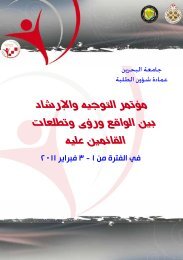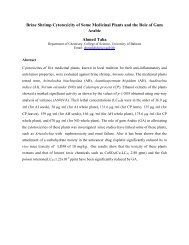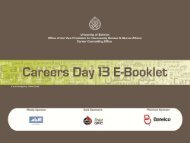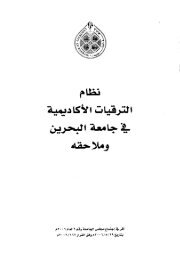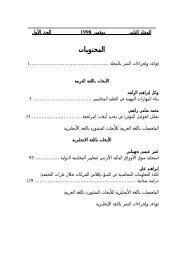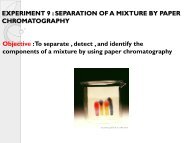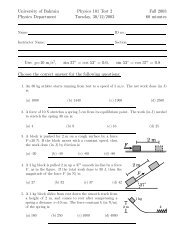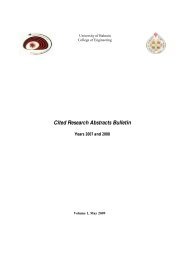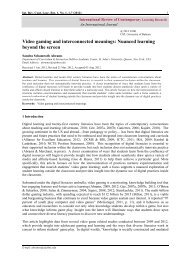د. ÙÙا بÙت عÙ٠اÙÙعÙ٠٠د. ÙÙÙÙÙÙÙÙادر ÙاظÙÙÙÙÙÙÙÙ٠د. ج٠ا٠... - جا٠عة اÙبØرÙÙ
د. ÙÙا بÙت عÙ٠اÙÙعÙ٠٠د. ÙÙÙÙÙÙÙÙادر ÙاظÙÙÙÙÙÙÙÙ٠د. ج٠ا٠... - جا٠عة اÙبØرÙÙ
د. ÙÙا بÙت عÙ٠اÙÙعÙ٠٠د. ÙÙÙÙÙÙÙÙادر ÙاظÙÙÙÙÙÙÙÙ٠د. ج٠ا٠... - جا٠عة اÙبØرÙÙ
Create successful ePaper yourself
Turn your PDF publications into a flip-book with our unique Google optimized e-Paper software.
193<br />
2 0 1 1<br />
مقاربات<br />
51), Jacob Taubes, in his book The Political<br />
Theology of Paul, has recognised Paul as a<br />
founder of a new people. However, Paul did<br />
that, according to Taubes who clearly came to<br />
this conclusion from a Jewish point of view, by<br />
enlarging the election of Israel. That reading<br />
might comfortably set Paul as a Universalist,<br />
but the admission to his universal group/set<br />
is only possible via what Taubes calls “the<br />
needle of the crucified one.” (Taubes 52)<br />
We have seen that Badiou does not have a<br />
problem with the requirement of fidelity, or<br />
in other words faith, to the new truth event<br />
on the part of the subject; in fact Badiou<br />
has prescribed that fidelity as a necessary<br />
condition for the becoming of the universal<br />
truth. However, that requirement presents a<br />
problem when considering the universality of<br />
what Badiou calls the ‘new truth’. As Taubes<br />
has highlighted in his own way, Badiou’s<br />
universal set constitutes its own subjects, and<br />
thus is not automatically universal as such to<br />
the situation. The changed subject required<br />
by Badiou’s universal set would make his so<br />
called universal truth applicable only to the<br />
particular set of the new believing subjects.<br />
The Subjective Division<br />
In a way that denied any relevance to the<br />
Platonic concepts of ‘body’ and ‘soul’, Badiou<br />
defined the relationship between the Pauline<br />
concepts of ‘flesh’ and ‘spirit” through what<br />
he called the ‘subjective division’. What Paul<br />
named as the ‘flesh’ and ‘spirit’ were in fact<br />
two subjective paths into which the Christian<br />
subject, as constituted by the Pauline/Christian<br />
discourse, is weaved into. This made the<br />
Christian subject a divided one.<br />
Badiou moved on to say that this subjective<br />
division of the Christian subject disqualified<br />
what other discourses identified as their<br />
objects: the ‘finite cosmic totality’ in Greek<br />
discourse, and the ‘elective belonging/sign’<br />
in Jewish discourse. Instead, Badiou defined<br />
the subject of the Christian discourse in terms<br />
of the ‘figure of the real’ where the ‘real’ was<br />
“that which is thought in a subjectivating<br />
thought” (55). It is worth noting here that<br />
Badiou made use of Lacan’s distinction<br />
between real and reality. According to Lacan,<br />
the real as being, in a situation, is a “point of<br />
impossibility which allows us to think of the<br />
situation as a whole, according to its real.”<br />
(Badiou Ethics 119) The real, as the thought<br />
being grasped by the two subjective paths that<br />
constitute the divided subject deploys itself in<br />
a relation to this division as ‘death’ and ‘life’.<br />
In light of this theorisation, Badiou translated<br />
Romans 8:6 in which Paul’s defines ‘flesh’<br />
and ‘spirit’ as: “The thought of the flesh is<br />
death; the thought of the spirit is life.” (55)<br />
In comparison, this same verse was translated<br />
in the New International Version of the New<br />
Testament as: “The mind of the sinful man is<br />
death, but the mind controlled by the spirit is<br />
life and peace.” (Rom 8:6)<br />
The consciousness of Truth<br />
In the conclusion of the book, Badiou used the<br />
term consciousness-of-truth as follows:<br />
“In reality, the Pauline<br />
break has a bearing upon<br />
the formal conditions and<br />
the inevitable consequences<br />
of a consciousness-of-truth<br />
rooted in a pure event,<br />
detached from every<br />
objectivist assignation<br />
to the particular laws of<br />
- 8 -





